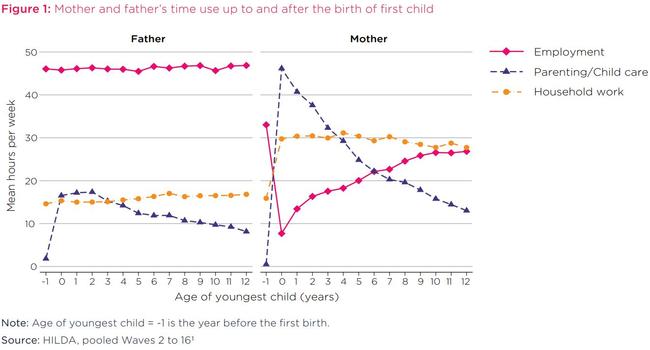When men have kids not much changes. For women, it’s the opposite
When women have children, their lives are changed “dramatically”. But a new study shows just how little men’s lives are impacted.
I remember those hazy weeks and months after the birth of my first child. I stayed at home with him for nearly 10 months, slightly demented from sleep deprivation, as my then husband went out to work. Neither of us seriously considered an alternative.
But that was 20 years ago. These days, things are very different.
Except they’re not different at all.
According to new research from the Australian Institute of Family Studies, the work lives of women continue to be “dramatically” changed by parenthood, whereas the work lives of men are not. Women work few hours outside the home when their babies are young, and average only part-time hours as their kids get older.
Most men, on the other hand, remain in full-time work over the course of their children’s lives. Though opportunities to work part-time are increasingly available, they are rarely taking them up.
This graph sums up the dilemma. When a child arrives, dads spend about the same number of hours at work, while a mum’s time is dramatically altered.

As a result, women continue to be disadvantaged long term. When women work part-time hours, they receive a part-time income, so they have fewer independent resources within the family unit. Frequently, this also translates to less financial autonomy, as many primary breadwinners believe they have the right to control the family income, despite the dependent spouse working as many or more hours in the home.
In fact, women are more than twice as likely as men to suffer from economic abuse, in which one person controls their partner’s access to bank accounts, cash, income statements and property in order to create financial dependence.
Even in marriages without economic abuse, the reduced income of mothers creates vulnerability. When marriages break down, which nearly a third of first marriages do, women are seriously disadvantaged by their decreased earning potential.
This is not just bad for individual women; it’s bad for our society. When women take breaks from their careers to raise children, they slow or halt their career progression. Fewer women end up in senior positions, and the balance of power in business and in the public service continues to be held by men.

But the solution isn’t simply one of increased access to parental leave. According to the Workplace Gender Equality Agency, when leave is available, it is almost always taken up by women. Our culture still maintains gendered attitudes to work and child care, and men are still largely regarded as the default breadwinners, and women as the default homemakers.
It’s so hard to change these entrenched ideas. We women carry the babies, so we can’t share the load of pregnancy. And then we give birth, and need to take time off work to recover, so we’re at home with the baby then anyway, right?
And, of course, we’re breastfeeding, so we may as well do the night feeds, because there’s no point two people waking up in the middle of the night. And then we’re exhausted from all the night waking, so we’re too fuzzy to go out to work anyway, so it’s good we have this time to be at home.
And then one day, the baby starts sleeping through the night, and we are less exhausted, but by then we’ve already been home with the baby for four or six months. There’s no point our husband leaving paid work now, because we need his income, and besides, we’d just have to teach him how to do everything. So we go back to work part-time, and continue on until the next baby comes, when we take more time off, and do it all again.
At least, that’s how it was for me 20 years ago.

But imagine if it hadn’t been like that 20 years ago? Imagine if it was the norm back then for at least half of new fathers to stay home with the baby from day one? Chances are, by now, there would be equal numbers of women and men in full-time work. Chances are, by now, there would be equal numbers of women and men in senior positions. Chances are, by now, women would be less economically disadvantaged, and hold an equal balance of power in society.
It’s the change we desperately need, but it must start now. We need to get more men at home, and more women in the workforce. Gender equality is such a hard road. It will take at least another 20 years.



